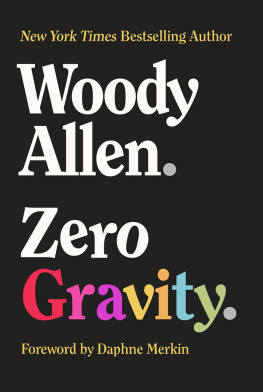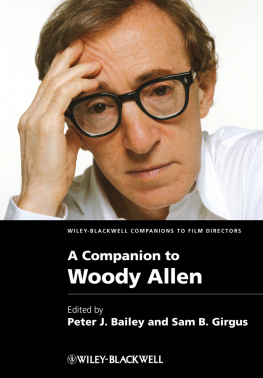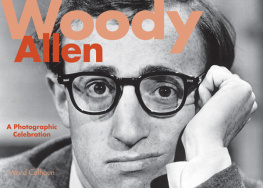Woody Allen - Side Effects
Here you can read online Woody Allen - Side Effects full text of the book (entire story) in english for free. Download pdf and epub, get meaning, cover and reviews about this ebook. genre: Detective and thriller. Description of the work, (preface) as well as reviews are available. Best literature library LitArk.com created for fans of good reading and offers a wide selection of genres:
Romance novel
Science fiction
Adventure
Detective
Science
History
Home and family
Prose
Art
Politics
Computer
Non-fiction
Religion
Business
Children
Humor
Choose a favorite category and find really read worthwhile books. Enjoy immersion in the world of imagination, feel the emotions of the characters or learn something new for yourself, make an fascinating discovery.

- Book:Side Effects
- Author:
- Genre:
- Rating:5 / 5
- Favourites:Add to favourites
- Your mark:
- 100
- 1
- 2
- 3
- 4
- 5
Side Effects: summary, description and annotation
We offer to read an annotation, description, summary or preface (depends on what the author of the book "Side Effects" wrote himself). If you haven't found the necessary information about the book — write in the comments, we will try to find it.
Side Effects — read online for free the complete book (whole text) full work
Below is the text of the book, divided by pages. System saving the place of the last page read, allows you to conveniently read the book "Side Effects" online for free, without having to search again every time where you left off. Put a bookmark, and you can go to the page where you finished reading at any time.
Font size:
Interval:
Bookmark:
Annotation
Before Woody Allen set his sights on becoming the next Ingmar Bergman, he made a fleeting (but largely successful) attempt at becoming the next S.J Perelman. Side Effects, his third and final collection of humor pieces, shows his efforts. These essays appeared in The New Yorker during the late 1970s, as he showed more and more discontent with his funnyman status. Fear not, humor fans-Allen's still funny. He is less manic, however, than in his positively goofy Getting Even/Without Feathers days, and this makes Side Effects a more nuanced read. Woody picks and chooses when to flash the laughs, as in an article discussing UFOs:
[I]n 1822 Goethe himself notes a strange celestial phenomenon. "En route home from the Leipzig Anxiety Festival," he wrote, "I was crossing a meadow, when I chanced to look up and saw several fiery red balls suddenly appear in the southern sky. They descended at a great rate of speed and began chasing me. I screamed that I was a genius and consequently could not run very fast, but my words were wasted. I became enraged and shouted imprecations at them, whereupon they flew away frightened. I related this story to Beethoven, not realizing he had already gone deaf, and he smiled and nodded and said, "Right."
Though not as explosively, mind-alteringly funny as his earlier books, Side Effects is still loaded with chuckles; the much-anthologized "Kugelmass Episode" is worth the price of the book. For fans of his films-or for anyone who wants a final glimpse of Woody in his first, best role as court jester, Side Effects is a must-have. -Michael GerberA humor classic by one of the funniest writers today, SIDE EFFECTS is a treat for all those who know his work and those just discovering how gifted he is. Included here are such classics as REMEMBERING NEEDLEMAN, THE KUGELMASS EPISODE, a new sory called CONFESSIONS OF A BUGLAR, and more.

It has been four weeks and it is still hard for me to believe Sandor Needleman is dead. I was present at the cremation and at his son's request, brought the marshmallows, but few of us could think of anything but our pain.
Needleman was constantly obsessing over his funeral plans and once told me, "I much prefer cremation to burial in the earth, and both to a weekend with Mrs. Needleman." In the end, he chose to have himself cremated and donated his ashes to the University of Heidelberg, which scattered them to the four winds and got a deposit on the urn.
I can still see him with his crumpled suit and grey sweater. Preoccupied with weighty matters, he frequently would forget to remove the coat hanger from his jacket while he wore it. I reminded him of it one time at a Princeton Commencement and he smiled calmly and said,
"Good, let those who have taken Issue with my theories think at least that I have broad shoulders." Two days later he was committed to Bellevue for doing a sudden back somersault in the midst of a conversation with Stravinsky.
Needleman was not an easily understood man. His reticence was mistaken for coldness, but he was capable of great compassion, and after witnessing a particularly horrible mine disaster once, he could not finish a second helping of waffles. His silence, too, put people off, but he felt speech was a flawed method of communication and he preferred to hold even his most intimate conversations with signal flags.
When he was dismissed from the faculty of Columbia University for his controversy with the then head of the school, Dwight Eisenhower, he waited for the renowned ex-general with a carpet beater and pelted him until Eisenhower ran for cover into a toy store. (The two men had a bitter public disagreement over whether the class bell signaled the end of a period or the beginning of another.)
Needleman had always hoped to die a quiet death. "Amidst my books and papers like my brother Johann." (Needleman's brother had suffocated under a rolltop desk while searching for his rhyming dictionary.)
Who would have thought that while Needleman would be watching the demolition of a building on his lunch hour, he would be tapped in the head by a wrecking ball? The blow caused massive shock and Needleman expired with a broad smile. His last, enigmatic words were, "No thanks, I already own a penguin."
As always, at the time of Needleman's death he was at work on several things. He was creating an Ethics, based on his theory that "good and just behavior is not only more moral but could be done by phone." Also, he was halfway through a new study of semantics, proving (as he so violently insisted) that sentence structure is innate but that whining is acquired. Finally, yet another book on the Holocaust. This one with cutouts. Needleman had always been obsessed by the problem of evil and argued quite eloquently that true evil was only possible if its perpetrator was named Blackie or Pete. His own flirtation with National Socialism caused a scandal in academic circles, though despite everything from gymnastics to dance lessons, he could not master the goose step.
Nazism was for him merely a reaction against academic philosophy, a position he always attempted to impress on friends and then would grab at their faces with feigned excitement and say, "Aha! Got your nose." It is easy to criticize his position on Hitler at first, but one must take into account his own philosophical writings. He had rejected contemporary ontology and insisted that man existed prior to infinity though not with too many options. He differentiated between existence and Existence, and knew one was preferable, but could never remember which. Human freedom for Needleman consisted of being aware of the absurdity of life. "God is silent," he was fond of saying, "now if we can only get Man to shut up."
Authentic Being, reasoned Needleman, could only be achieved on weekends and even then it required the borrowing of a car. Man, according to Needleman, was not a "thing" apart from nature, but was involved "in nature," and could not observe his own existence without first pretending to be indifferent and then running around to the opposite end of the room quickly in the hopes of glimpsing himself.
His term for the life process was Angst Zeit, loosely meaning Anxiety-Time and suggested man was a creature doomed to exist in "time" even though that was not where the action was. After much reflection, Needleman's intellectual integrity convinced him that he didn't exist, his friends didn't exist, and the only thing that was real was his IOU to the bank for six million marks. Hence, he was charmed by the National Socialist's philosophy of power, or as Needleman put it, "I have the kind of eyes that are set off by a brown shirt." After it became apparent that National Socialism was just the type of menace that Needleman stood against, he fled Berlin. Disguised as a bush and moving sideways only, three quick paces at a time, he crossed the border without being noticed.
Everywhere in Europe Needleman went, students and intellectuals were eager to help him, awed by his reputation. On the run, he found time to publish Time, Essence, and Reality: A Systematic Reevaluation of Nothingness and his delightful lighter treatise, The Best Places to Eat While in Hiding. Chaim Weizmann and Martin Buber took up a collection and obtained signed petitions to permit Needleman to emigrate to the United States, but at the time the hotel of his choice was full. With German soldiers minutes from his hideout in Prague, Needleman decided to come to America after all, but a scene occurred at the airport when he was overweight with his luggage. Albert Einstein, who was on that same flight, explained to him that if he would just remove the shoe trees from his shoes he could take everything. The two frequently corresponded after that. Einstein once wrote him, "Your work and my work are very similar although I'm still not exactly sure what your work is."
Next pageFont size:
Interval:
Bookmark:
Similar books «Side Effects»
Look at similar books to Side Effects. We have selected literature similar in name and meaning in the hope of providing readers with more options to find new, interesting, not yet read works.
Discussion, reviews of the book Side Effects and just readers' own opinions. Leave your comments, write what you think about the work, its meaning or the main characters. Specify what exactly you liked and what you didn't like, and why you think so.








